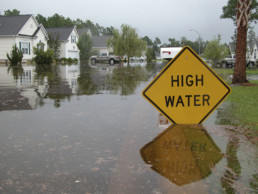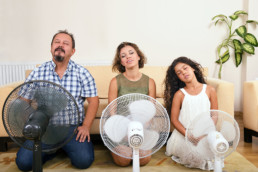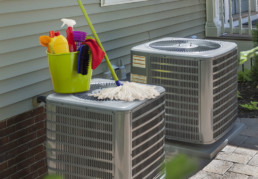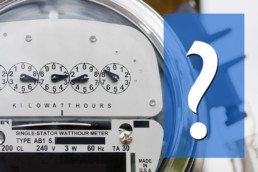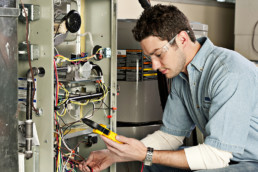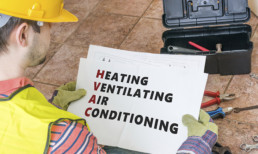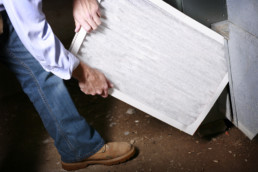Flooding and Your HVAC Equipment in Southwest Florida
People who live in flood zones in Southwest Florida have to think about more than simply weathering storms. Many people board up windows and place sandbags around their homes in an effort to keep floodwaters from encroaching and damaging their property. In addition to their personal property inside of their homes, homeowners who live in flood zones also have to worry about their HVAC units.
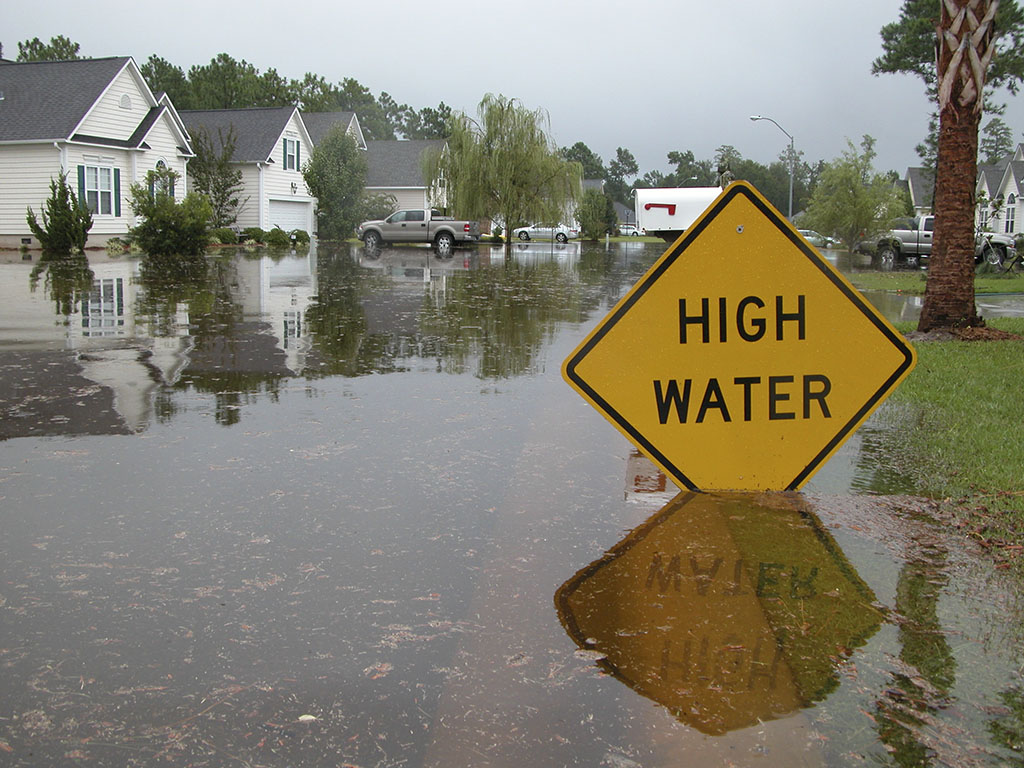
These units may become damaged in floods and need to be replaced. People should also be aware that many areas in the region have recently been rezoned as flood zones, making it important for people to move their HVAC systems above the design flood elevation to protect them in case a flood occurs.
How floods can damage HVAC units
While it is true that some HVAC components that are made out of steel or copper are made to withstand all types of water, the units may not be able to withstand flooding HVAC events that can happen in hurricanes and other natural events. Flooding HVAC systems can cause electrical components to short out in electric HVAC systems. The lowest electrical component is normally the component that will short out first in systems that are placed at or near the ground level. Gas units may not withstand floods at all. Most of these units have their gas burners and heat exchange located at the very base of them, which are what floodwaters can damage.
Protect HVAC units by moving them
Waterfront HVAC systems must be placed at elevations that are greater than the design flood elevation for the area in which the homes are located. It is common for homes in some flood zone regions of Florida to have their systems placed at heights of 18 feet or higher. If you live in an area that has recently been rezoned as a flood zone, it is important for you to relocate your existing HVAC system to a higher elevation. This may take work to reroute the electrical wiring and the ductwork since all of it must be placed above the design flood elevation level. In addition to moving your HVAC system to a higher level such as your attic, there are a couple of other methods that you might be able to use if moving the system is not feasible.
Building a wall
If your home simply doesn't have enough room to relocate your waterfront HVAC unit, you might be able to protect it from flood waters by building a wall to enclose it. An experienced contractor can design a walled enclosure for your HVAC unit that can protect it from floodwaters. Its height will depend on the 100-year flood level of the area in which you live, and it should be built with an access point and enough room inside for regular service and maintenance to be performed.
When you should move your HVAC
HVAC units are expensive, and waiting until they have already been damaged by a flood is not a good idea. You should instead move your HVAC unit before a flood happens. Since moving it will take substantial work in relocating the wiring, drainage pipes and ductwork, it might be a smart idea to relocate your HVAC unit at the same time that you purchase a new system. Buying a new HVAC system can also help you to save money on your utility bills if your existing system is an older model because of the greater energy efficiency ratings of modern HVAC systems.
Get help from the experts at Mahle Cool Air & Heating
The best time to prepare for flooding is before it occurs. In addition to making certain that you understand what your flood insurance will cover, you should also try to minimize your potential losses through planning. It is a good idea to get help from the professionals at Mahle Cool Air & Heating to relocate your existing HVAC unit or to locate a new unit in a manner that can help it to withstand floods.
To learn more, contact us today to speak with one of our HVAC professionals. Call or Text (941) 203-7955
Get Your Air Conditioner Ready For Florida Summer Temps
As summertime approaches in Florida, homeowners from Sarasota to Venice to Englewood and every city and town in between begin looking for ways to prepare for the increased, humid temperatures. Preparing the air conditioning unit for the weather ahead is the best way to keep energy consumption (and costs) down and maintain comfort throughout the home.
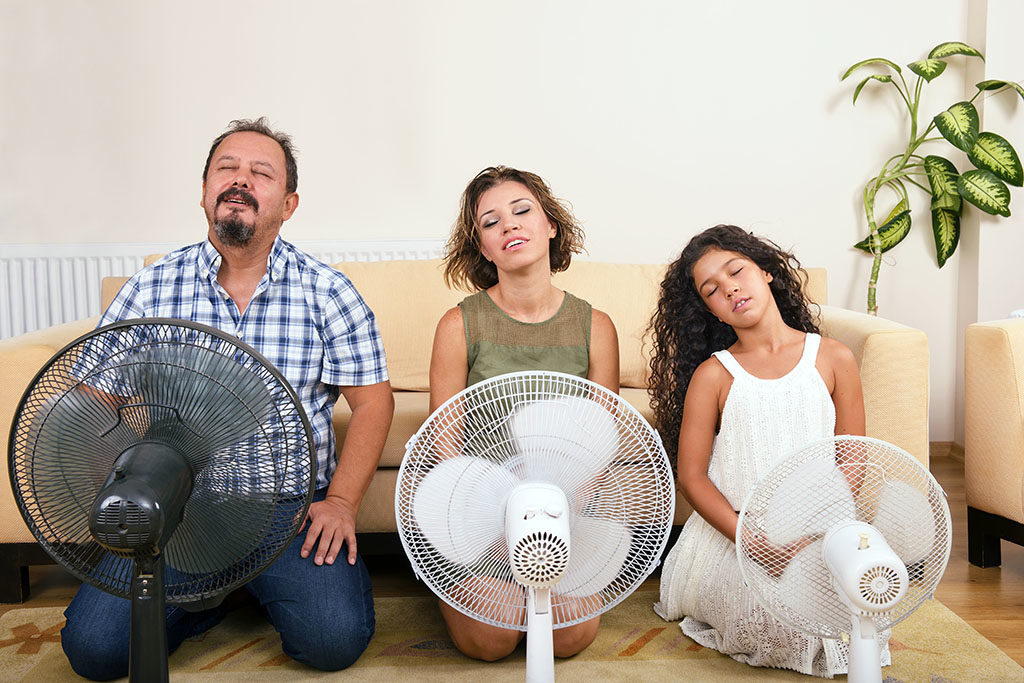
To prepare your air conditioning unit for the summertime weather, first ensure that you understand how the unit works.
Three components make up the A/C unit. This is the condenser, blower unit, and the ductwork. Each of the three components serves an important function in the overall operation of the air conditioning unit.
Ductwork: Metallic, flexible tubes that run through the home are known as the ductwork. The tubes route cold air into the house and remove the hot air. Leaking ductwork is a common problem with this component, though it is safe to say there is a problem if you notice more dust in the home than usual. The leaking ductwork causes an even more serious problem, however, and that is air leakage. Any space between the wall that is leaking is also causing the cooled air to blow between. This causes difficulty cooling the house. Springtime is the perfect time to inspect and/or clean the ductwork to improve AC performance and efficiency.
Condenser: The condenser is the unit sitting outside the home. The refrigerant is added to the condenser, which controls temperatures inside the home. The refrigeration works to absorb heat after the air flows over the evaporator coils. A pressure change causes the refrigerant to turn into a gas that resumes liquefied state when it is cooled again.
Blower Unit: The blower unit helps change the liquid into a gas as the refrigerant enters this space and travels into the coil. This unit draws the warm air into the return ducts while the air conditioning unit pushes the air over the coils into the house to keep it cool. The refrigerant goes back into the condenser and converts back to liquid state after completion of this process.
How to Prepare Your Air Conditioner for Summer
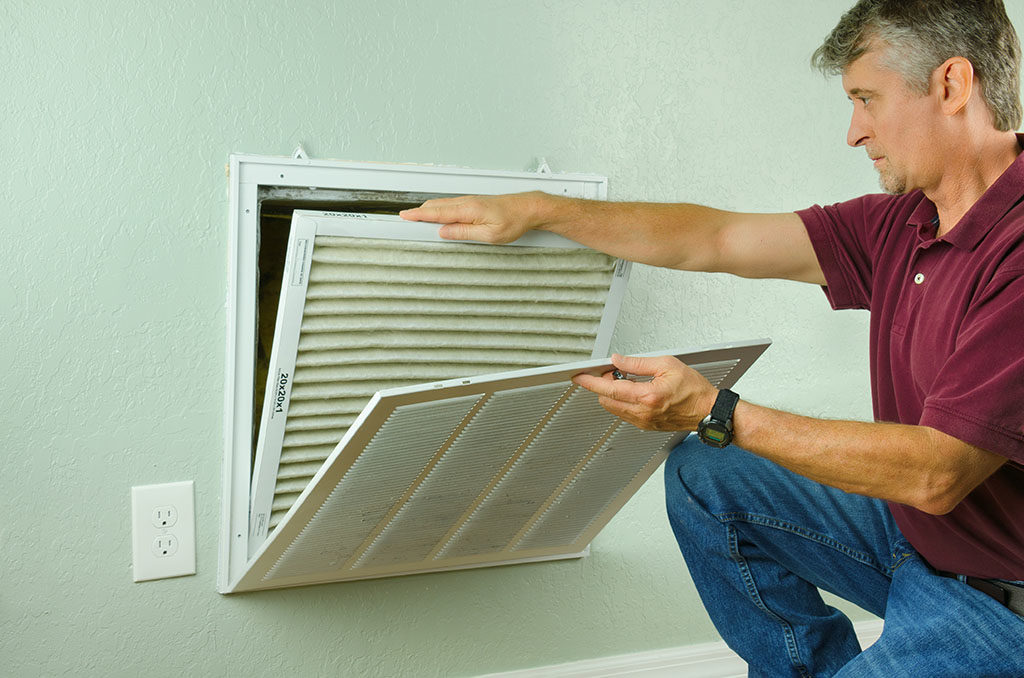 Professional repair serviceman or DIY homeowner removing a dirty air filter on a house air conditioner so he can replace it with a new clean one.
Professional repair serviceman or DIY homeowner removing a dirty air filter on a house air conditioner so he can replace it with a new clean one.
Air Handler Filter Change
Dust, pollen, and other debris are collected inside of the filter. If the filter becomes filled, it performs the opposite job and begins blowing the collected items back outside the unit. The result is decreased comfort, increased energy costs, and an unhealthy environment inside the home. Dirty filters also damage the unit, decreasing its longevity and durability. It is one of the most important components of the A/C unit. Monthly filter changes ensure these issues do not become your own.
Keep the Condenser Unit Free of Debris
Debris and trash can accumulate around the condenser unit outside the home. This causes improper air circulation that damages the A/C unit and its components. Ensure that no debris or trash is allowed around the outdoor unit. Additionally, use these tips to prevent issues with the outdoor unit:
- Use a garden hose to wash the dirt away from the unit
- Trim grass around the unit, keeping it at a short length
- Keep bushes away from the unit
- Do not allow tree branches to overhang on the unit
- Do not place other items on or near the unit
Clean the Condensate Drain
There is a thin piece of PVC pipe situated close to the condenser unit. You'll notice water dripping from this unit. This is normal, though the moisture build-up can attract algae that clog the line; condensation is the result. This may cause water to enter the home, triggering the cooling equipment to shut-off.
It is simple and necessary to clean the drain. Just remove the end of the drain and use a wet/dry vac to remove the slide and water accumulated in the drain. Replace the end when finished.
Check Refrigerant Levels
There are two copper lines running to the condenser unit. Find the larger of the two lines. Sometimes there is insulation around this line. If the line doesn't sweat during A/C cycling or the line is warm after the unit is running, coolant is needed.
Level the Condenser Unit
Check to ensure that the condenser unit is level using a level. Gravel or a small board can help fill any uneven spaces.
A/C Maintenance Inspection
Finally, call a professional A/C repair company Mahle Cool Air & Heat for an annual maintenance inspection. Air conditioning maintenance prolongs the lifetime of the HVAC unit while reducing discomforts and need for repairs. Reduced wear-and-tear is another benefit of this annual inspection. A/C pros thoroughly inspect the unit, looking for signs of damage or breakdown. Those issues are then immediately repaired, reducing headache and hassle. Call or Text us today for more details (941) 203-7955.
The Future Technologies Of Air Conditioning And HVAC Systems
As often as certain innovations like predictive text make people want to pull their hair out when its prediction isn't so accurate, innovate technology undeniably improves and simplifies our lives for the better.

Homeowners in Venice, Florida and around the world have some more innovation to look forward to when it comes to HVAC technology making life more comfortable, simple, and efficient. While some of these are still in the design phase, others are ready for you to apply to your home today. Let's explore some:
Ice-Powered Air Conditioning
Avid campers who've set a fan over an open ice cooler probably already know the premise behind the ice-powered AC unit.
The ice-powered AC takes the premise of that old camping trick to a new dimension as a possible way to heat and cool entire buildings. The technology still has a quite a long road ahead before it can apply sole, long-term, consistent cooling capabilities, but the initial test results of the Ice Bear by a Cali-based company are quite promising.
The Ice Bear system freezes water in a tank, which is an overnight process. The next day, the system uses this frozen water to help cool a building. Testing thus far in commercial buildings have shown about six hours worth of cooling time before the building's traditional commercial unit kicked in to maintain the desired temp.
Bottom line: It's a promising application still working out design flaws and limited capabilities.
Thermally Driven Air Conditioning
This design has already been implemented in several foreign settings, but it's not yet something widely available through mass production.
Chromasun, an Aussie company, has been successful at producing these thermally driven air conditioning units. They're hailed as a low-cost alternative to their traditional electrical counterparts.
Solar energy is the premise behind the design. When solar energy isn't available or depleted, then natural gas component kicks in and takes over to power the unit.
Double-chiller designs eliminate the need for electricity completely and have the most cooling power of all the thermally-driven designs thus far.
Bottom line: These are highly effective and efficient systems, but finding them may be an issue. It will likely be years before the technology becomes widespread and mass-produced in the U.S. and before installers and HVAC technicians become proficient with the technology.
Movement-Activated Air Conditioning
Have you noticed a trend? Air conditioner systems leave a lot of room for innovation and evolution.
So far, you've seen engineers taking the mechanics of the AC apart to improve it. But, what about just making the existing mechanics as efficient as possible by changing the design, or rather how the design is applied?
That's exactly what MIT engineer students did with the movement-activated air conditioning unit.
This design features aluminum rods being hung from the building's ceiling. Each rod is lined with sensors that communicate with the AC unit. Movement within the building activates the sensors to signal to the AC unit that people are present and it needs to turn itself on; when people aren't present, then the unit knows it can stay off because it's not needed.
Simple, smart right? Makes you wonder why it's just now being thought about as a way for homeowners and businesses to reduce energy and electric bills.
Bottom line: It's an ingenious application that's likely to be one of many future ways to reduce energy costs through need-only design capabilities.
3-D Printed Air Conditioners
No need for foil hats and beta ray guns just yet. The idea of 3-D printed AC units may seem more sci-fi than reality, but the fact is that it's an idea being toyed with more and more as 3-D printing has become more advanced in an array of real-world applications.
Emerging Objects is a company that's already successfully used 3-D printing to create a brick that draws moisture from a moderate temp area to cool it.
Bottom line: 3-D printed air conditioners are just a novel idea at the moment. To say this application may hit stores tomorrow, would be akin to someone having promised a smartphone after the first "bag" mobile phone hit. The technology still has a long, long road ahead before it reaches application for AC units.
On-Demand Hot Water Recirculator
A Rhode Island company has successfully designed a pump that's "on command" in working with a building's water lines.
What does this do? It saves water. When activated, it basically allows cool water to be circulated back to the water heater. It's an engineering solution to the amount of water being needlessly wasted. As the average home waits for water to be warmed, it wastes around 12,000 gallons per year.
Bottom line: From efficiency washing machines and dishwashers, we've seen such eco-friendly measures gain the public's seal of approval and the U.S. government incentivizing such measures. The AC recirculating technology is just the next logical eco-friendly step to make future homes as waste not, want not as possible.
Sensor-Enhanced Ventilation
We first saw the Ecovent debut at technology expos in 2015, and many viewed it as the star tech of the show. The premise is sensor-enhanced ventilation.
The Ecovent replaces the traditional wall, floor and ceiling vents with sensor-driven vents capable of monitoring facets like air quality, temperature, and air pressure.
Users connect their smartphones to the Ecovent system via an app to monitor the above features and enable precise temp control on a room-by-room level. So, instead of simply being able to remotely control your unit coming on and off, you can exactly control which areas within the home or building you want to be cooled or heated and which you don't.
Bottom line: This is the type of controlled, comprehensive heating and cooling remote capabilities that consumers want. The Ecovent is already on the market for public consumption.
Computer Heating Capabilities
Laptop users that utilize their laptops for its namesake, that is put it in their laps, have likely felt just how hot they can get after just a couple hours of usage. Why waste energy you're already creating? What if that energy via heat could be harnessed?
Founder of Project Exergy, Lawrence Orsini, has been looking into just that as he is testing how efficiently computers generate heat and how that heat could be applied to power a heating system for the home.
Bottom line: It's the same basic idea here as power generated from water or power generated from riding a bike. The difference is in the potential power and the amount of the source. Big bodies of water, for example, produce big amounts of energy, making it relatively easy to harness and apply that power. It's yet to be determined what exactly can be done with the comparatively minuscule amount of heat from a computer. The verdict is still out as to whether or not this idea has a practical application.
Dual-Fuel Heat Pumps
By using two fuel sources, which are usually an electric heat pump and a gas furnace, the idea is that these heat pumps provide a maximum comfort level with more efficiency. Gas heat is used at low temps to maximize energy. Electricity is used when temps are 36 and above.
Bottom line: These are already on the market. Dual-fuel pumps are more costly to install than a traditional pump system. However, those costs are recouped in energy costs within the first few years of using the system.
Geothermal Heat Pumps
A geothermal heat pump is another option to lower energy costs. These pumps utilize energy from the earth. An underground pipe absorbs the earth's natural heat and delivers it to the home for heating purposes. Likewise, when the home needs to be cooled, the pump extracts warmth from the home. Of note, geothermal heat pumps can also provide hot water to the home, which further reduces your energy costs.
Bottom line: These pumps have been available since the early 1940s. Yet, their innovative roles have mostly been overlooked due to their higher upfront costs. Today, more consumers are realizing that the upfront investment is worth the long-term energy costs savings.
Fully Automated Homes
American architect firm Specht Harpman built a full-functioning automated home that they dubbed as the ZeroHouse. It comfortably houses up to four adults. Fully automated means that the home is self-sustaining and functions independently of any outside sources of energy. Yep, no electric bill here. Everything from waste disposal to water is automated.
Bottom line: While gathering all the necessary minds, supplies, materials, and funds to build a fully-automated home isn't something widely available to the average Joe just yet, the technological advancements finding their way into the mainstream market and the various disciplines becoming more attune to societies desire for eco-friendly solutions is promising to a wider availability of such total eco concepts.
Smart Homes
While you await your fully automated home...
You can always make your home as smart as possible.
Everyday items, from our transportation and appliances to our entertainment and phones, are getting smarter to provide function without sacrifice to the environment and our finances. Technology is also affording us comfort, efficiency, and simplicity through connectivity.
A simple push of a button on your mobile device or laptop can remotely control anything from the lighting, HVAC, security, surveillance, to entertainment. And, many of these applications work congruently to provide you with a comprehensive approach to manage your home while you're away from it.
Bottom line: These innovations exist all around consumers, but it's the delivery and service industry who've often been slow on the uptake. As HVAC engineers and designers, for example, have been churning out innovative products for decades, the retailers and service industry have predominantly stuck with only knowing and promoting conventional options. Today, there's a higher consumer demand for these innovative products that make life easier, more efficient, and more comfortable. And, the delivery and service industry are finally following suit to meet that demand.
In closing, you've seen that some HVAC technology ideas are still on the drawing table, some are working out kinks, some haven't yet caught a footing for mass market production and consumption, and some are just awaiting you to contact a professional to install it.
If you're interested in learning more about any of these high-tech HVAC systems or other future HVAC technology applications coming to the Venice, Florida area, then call Mahle Cool Air & Heating today. Call or Text us today for more details (941) 203-7955.
Save Money This Year With a Clean Central HVAC System
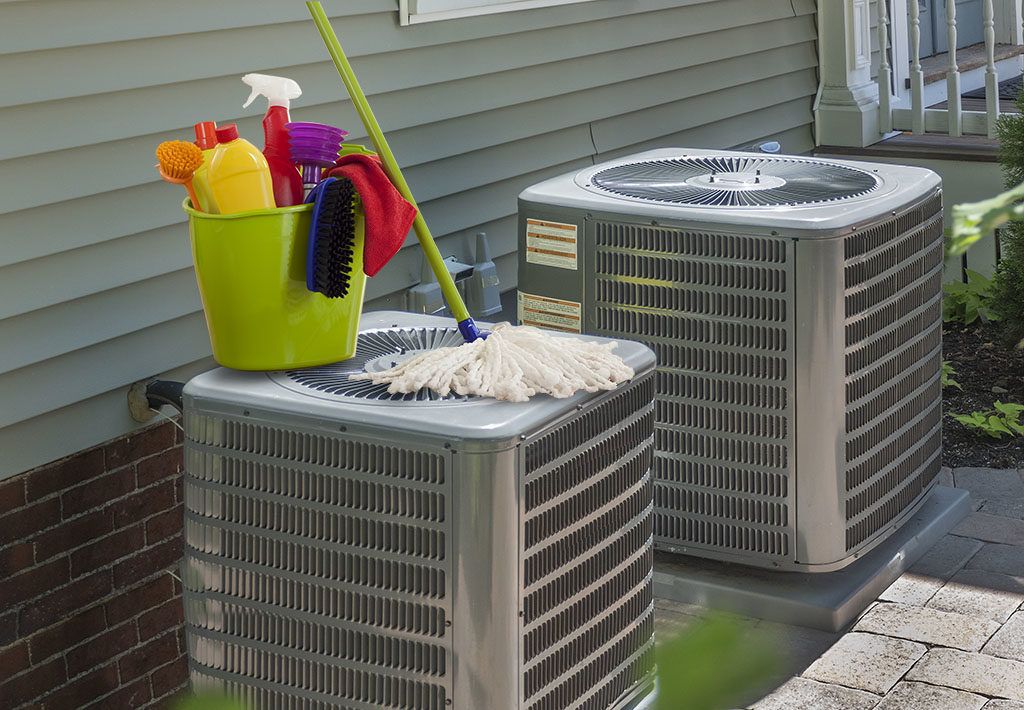
If you are looking for a way to save money throughout the year so that you can safeguard your budget, turning to your heating, ventilating and air conditioning unit is one of the best places to start.
Some people ignore air conditioning maintenance because they want to save time and money, but doing so is expensive when you look at the real cost. A dirty HVAC unit requires more power than normal to operate at its best. When you explore the ways a dirty HVAC unit can cause your energy bill to increase, you will know that taking care of the problem is the smart move.
Dirty Ducts
You might want to take a look at your ventilation system if you have not done so this year. As you run your HVAC unit, dirt can build up and restrict your airflow, forcing your HVAC unit to work much harder, and it will increase your power bill more than you likely suspect as well as expose occupants to allergens, dust particles, and mold.
Dirty Air Handler
Air handler cleaning is another way to decrease your energy bill so that you will have more money to spend on the things you enjoy. Although your filters work hard to protect your HVAC unit, dust and other small particles can still build up if you are not careful. A dirty air handler will put stress on your HVAC unit, and your utility bill can alert you to the problem before you notice the other red flags. Air handler cleaning is always worth the investment when you look at the long run.
Dirty Filters
When air conditioning maintenance is near the top of your mind, you won't want to forget about your filters. The filters in your HVAC unit collect dust, dirt, allergens and other things that will harm the quality of the air in your home. Failing to maintain your filters will enable dirt to build up and block the flow of air. Not only will this problem impact the air you breathe, but it will also affect your energy bill each month. Ensuring that your filters are in good shape is a critical part of the puzzle that will pay for itself in no time.
A Team of Experts on Which You Can Depend
Once you realize that cleaning and maintaining your HVAC unit is an investment that offers impressive returns, you will know what to do. At Mahle Cool Air & Heating, we will perform cleaning and other maintenance tasks that will keep your HVAC unit running at its best for as long as possible. When you enlist our help, a member of our team will come to your location to inspect and address any issues you might be experiencing. Everyone deserves to have fresh, comfortable air at a reasonable price, and we can help you achieve that goal. Call or Text us today for more details (941) 203-7955 and don't forget to check out our specials.
How Much of your electric bill is the air conditioner?
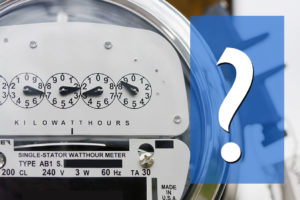
While summer is the hottest time of year, in Florida you will likely need to run your AC even during the winter months to get some relief from the heat and humidity. Air conditioning keeps you cool, helps you to avoid heat stroke, and overall create a more comfortable environment to complete your daily tasks. The cost of heating and cooling is something that is a concern because the average household spent almost 50 percent of their energy bill on cooling costs during the summer months in 2009. It’s beneficial to understand how much your air conditioner energy use will affect your electric bill.
Size of the air conditioner
The size of your air conditioner is the primary factor to consider when calculating your electric costs. Air conditioners are sold in small, medium, large, and extra-large rooms. British Thermal Units (BTUs) is how air conditioners are measured and based on how much square footage they’re designed to cool effectively. A small air unit designed to cool up to 150 square feet is 5,000-6,000 BTUs, while a larger one made to cool 450 square feet averages 10,000 BTU. They can be purchased in BTUs up to 24,000 for rooms up to 1,560 square feet. A larger unit is ideal if you have an open floor plan that allows the air to circulate between rooms.
Other factors
The size of the room isn’t the only thing you need to consider. Factors such as excessive sunlight, rooms that hold more people, and the kitchen benefit from having a unit with a larger BTU. The outside temperature is something else to keep in mind because it will take more energy and runtime to drop the inside temperature to a comfortable level. Well-insulated rooms cool easier and require less electricity, while a room with poor insulation is going to increase your bill a bit more. Check the energy efficiency rating for each unit. The majority of units comply with Energy Star standards to conserve on usage. They use up to 14 percent less energy than the government requirements to qualify for the rating, and in some cases qualify for a tax credit.
Reducing costs
Keep your costs lower by taking additional steps to reduce consumption. Ensure that your unit is adequately rated to cool the room you’re installing it in. A 5,000 BTU air conditioner will not cool a room that is 1,000 square feet. It will need to work at maximum capacity and still be ineffective at cooling down the room temperature. Most units are programmable and allow you to set the temperature while you’re in bed or at work to cut costs. Draw the blinds during the day to keep the sun out and open windows at night to let cool breezes in, instead of running your air conditioner all night long while you’re sleeping. You can even set them to turn on shortly before you get home to cool the house down before you get in the door.
Calculation
A small 6,500 BTU air conditioner will use about 144 kWh running for six hours a day, while a larger 12,000 BTU unit running for six hours every day will use about 270 kWh per month. These are estimates and the settings on your unit and the other factors that impact usage will impact your average consumption. If you’re home all day or need to run your air conditioner at night to be comfortable, your air conditioner energy use will be higher. It's going to fluctuate from month to month depending on how the price for each kWh is on your bill.
Your electric costs also depend on where in the country you live in. Some states have lower rates than others, and they fluctuate from month to month making it difficult to estimate exactly how much running your air conditioner will cost you from one month to the next. Utilize these tips to cool your house down while keeping your costs low. Call or Text us today for more details (941) 203-7955 and don't forget to check out our specials, financing, and rent-to-own options.
Easy Ways To Keep Your Air Conditioner From Breaking
It’s crucial that you maintain your air conditioning unit to make sure it runs smoothly and operates for years to come. No matter what kind of AC unit you may have, it should last for a number of years, as long as you take good care of it. To help get you started, follow our guide below to keep your AC unit in peak shape.

1. Regularly Clean your AC Unit
Even if you have protection on your AC unit, it will still need routine cleanings to run efficiently. Since it’s located outdoors, it’s bound to get dirty, in which case you’ll need to remove dirt, dust, and other debris that can prevent your AC unit from working optimally.
2. Inspect Your AC Unit for Leaks
You should inspect your air conditioner every few months to check for leaks or cracks. However, if you notice a leak in the hose, you could have an air conditioner broken sooner than you think. Proper air conditioner maintenance can help prevent this from happening, as well as any other further damage or sign of wear.
3. Allow Your AC Unit to Circulate Air
Your AC unit’s main purpose is to push cold air into your home, so it’s important that your AC doesn’t suffer from obstructions that can prevent it from doing its job. You can easily do this by opening up your AC unit or having a professional clear the system of any dirt or debris that may be clogging the system.
4. Don’t Run Your AC Unit Non-Stop
If you run your air conditioner 24/7, it will wear out sooner than you’d want, which can cause it to run into a number of problems. If you plan on leaving your home during the day, it’s important that you turn it off before you leave and give it a break once in awhile. Additionally, turning your AC to push air into your home, but not cool it, can help prolong its shelf life and prevent it from burning out.
5. Clean Your AC Unit’s Air Ducts
In some cases, the reason your home may not be cooling fast enough it because your air ducts may be dirty and/or clogged. Cleaning out your AC’s air ducts can easily solve this problem and should be a regular practice. In addition to unclogging your AC system, cleaning your AC unit’s air ducts can also greatly improve the air quality in your home by reducing the amount of dust being pushed into your house via your AC.
6. Change Your AC Unit’s Filter
You should change your air conditioning unit's filter about every 30 to 60 days, depending on how much you are using it. During the summer and other times when your unit is undergoing heavy use, you should change the filter more frequently. Many homeowners forget this step and suffer because of it. With a clogged filter, your unit will have to work harder to complete its job. This lowers the efficiency and costs you more money. Make your AC system last longer and function better by replacing your filters often.
7. Get Routine AC Tune-ups
One of the most important things you can do to extend the life of your air conditioning unit is getting it checked up regularly. Schedule your tune-up with a professional in the spring so you can make sure it is functioning properly in the summer when you really need it. By performing routine air conditioner maintenance, you can keep your unit working in like new condition, catch any problems before they worsen, and prevent new issues from arising.
Here are a few more benefits of routine air conditioner tune-ups:
- Boost Durability: By getting your unit thoroughly checked, you can extend its usable life. Because your unit will be more durable, you can put off buying a new one. This, combined with fewer issues, will end up saving you money.
- Lower your Energy Bills: If your system is maintained properly, it will not need to work as hard to cool your home and reach ideal temperatures. Since the unit does not need to work as hard, it will use less energy and cost less to operate.
- Increase Reliability: When you get your unit tuned up every year, you limit the risk of an air conditioner broken mid-summer when you need it most. You don’t need to worry about emergency repairs when your system is clean and nonfunctional parts are repaired.
Are you finding your AC unit not performing as well as it should be? With the help of our tips above, you should be able to prevent your AC unit from breaking, while improving its performance at the same time. After all, the last thing you want to do is pay hundreds in repair costs for small everyday maintenance tasks you could have done to prevent severe damage to your home’s AC unit.
Why Should I Have My AC Unit Serviced If It's Not Broken?
Central air conditioners have been a boon to sweltering families during the summer since their introduction in the 1940s. Advances in technology have brought computer controls and more environmentally friendly coolants to central air conditioning systems. The 21st-century central air conditioner is a reliable and powerful product; however, it still needs regular maintenance to remain so.
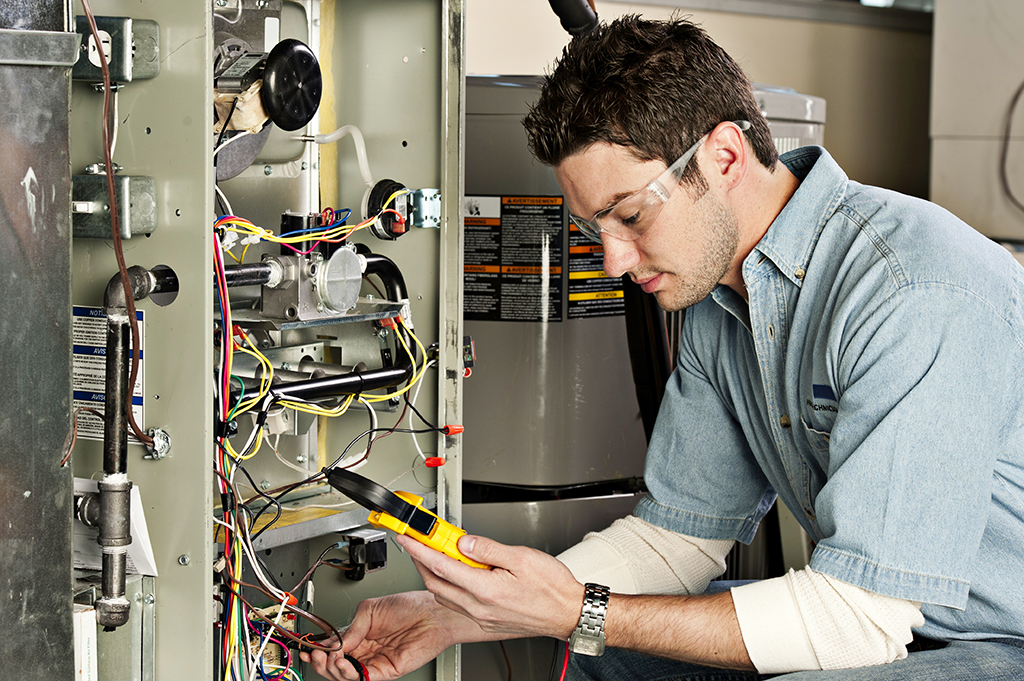 Generally, people will call a repair person if something breaks. If your air-conditioning unit is putting out tepid air when it's 95 degrees outside, you can bet you'll call the repair folks. By periodically having someone in to check your unit over and spending a little bit on preventative maintenance, however, you can save yourself a great deal of money. Federal laws now prohibit the refilling of leaky air conditioners, particularly those that use R22 Freon®, without any of those leaks being repaired.
Generally, people will call a repair person if something breaks. If your air-conditioning unit is putting out tepid air when it's 95 degrees outside, you can bet you'll call the repair folks. By periodically having someone in to check your unit over and spending a little bit on preventative maintenance, however, you can save yourself a great deal of money. Federal laws now prohibit the refilling of leaky air conditioners, particularly those that use R22 Freon®, without any of those leaks being repaired.
Finding leaks is a time-consuming proposition. First, all the Freon® must be pumped out of the system, and the system must be filled with harmless nitrogen. Then, a technician must go along every pipe both inside and outside of the home and check every inch for leaks. Remember, there might also be multiple leaks. Once all the leaks have been found, they must be plugged. Thereafter, the technician must empty the nitrogen from the system and use what's known as a sealant kit to doubly seal the inside of all the pipes. Only then can the Freon® be recharged. Furthermore, if the technician does an examination of both the outside fan assembly and the furnace and determines that the problem is with one of those two units rather than in one of the pipes, the bigger units must be replaced anyway.
Because heating, ventilation, and air-conditioning, or HVAC, is a skilled trade, you can expect to pay the skilled technicians who come to your home or business at a commensurate rate. In most cases, the fee just for showing up will be somewhere between $60 and $100, and the hourly rate is likely to be equal to that or more. If your problem occurs after hours and requires immediate assistance, you can expect to pay double those rates as overtime. In short, if you just leave your air conditioner be until it breaks, you could spend as much as $1,000 for a repair person to do the necessary work or even $2,000 during overtime hours. Even after that, the technician might tell you that you need to replace your equipment.
By contrast, a preventative maintenance check will usually take less than half an hour. The technician will check the Freon® pressure and use a gauge to see if there are any leaks in the line. He or she will also check to make sure the temperature regulator is in good order and that the air temperature that is produced by the unit is within operating parameters. At the furnace, the technician will check to see if the coil is in working order and if it's freezing up for any reason. Such a visit, even at $100 an hour, will cost at most $150 or $200 after figuring in the "showing-up" cost. The best part is that you only have to do such inspections about once a year. As they say, forewarned is forearmed.
Eventually, however, even the hardiest air-conditioning unit will give up the ghost no matter how much maintenance you've done. If this happens to you, your first question is likely to be: "Should I fix it, or should I scrap it and buy another one?" Fixing it is always less expensive, but you have to consider how much it would cost to fix it in the future were it to break down again. There's a simple formula for figuring this out: Take the repair cost and multiply it by the age, in years, of the unit. If the result is greater than $5,000, which is the usual cost of a new unit, get the new unit. For example, let's say your unit is 10 years old. If a repair is $500 or less, do the repair. Otherwise, start shopping around for a new unit.
How to Get Your Air Conditioner Ready for Summer Heat
One of the most significant factors that will impact your home's energy costs throughout the summer months is your cooling system. When an air conditioner has been properly maintained, it can operate with peak efficiency, and this can result in a drastic reduction in cooling costs as well as the decreased likelihood that you will have to endure downtime and repair bills throughout the summer season. There are a few steps that you can take now that will help you to better maintain your home's air conditioner. By implementing these tips today, you may enjoy lower energy bills with improved efficiency throughout the summer season and beyond.

Change the Air Filters on a Regular Basis
If your system uses disposable air filters, it is important that you change these out at least once a month. Dirty air filters will block the flow of air as it passes from your HVAC unit, and this can cause the system to work harder to force the air through the filter than it otherwise would need to. It also can lead to a reduced life span for your system and increased repair bills over time. Ideally, the filter will be replaced before you see visible signs of dirt on it. If you have a filter that is reusable, be sure to wash it according to the manufacturer's recommendations on a regular basis.
Clean the Outdoor Unit
Air conditioners have both indoor and outdoor units, and outdoor units, which are also known as condensers, can easily get dirty with regular exposure to the elements. Take a moment to inspect your condenser unit on a regular basis to look for signs of plant growth creeping up around and into the unit. Also, look for grass clippings and other elements that may eventually work their way into the system and cause inefficiency in its operation. If you choose to clean the HVAC unit on your own, always turn off the thermostat before working on the condenser to prevent damage to the unit and injury to yourself.
Schedule Duct Cleaning Service
The air ducts are responsible for carrying climate controlled air through your walls and ceilings to bring cool air to the rooms of your home. They can easily accumulate matter that ranges from dust and pet dander to bacteria, mold spores and more. When these become clogged, the airflow cannot pass efficiently through the ducts, and this creates inefficiency with the HVAC unit itself. Generally, a professional will need to clean the ducts for you, and this should be done every year or two for the best results. The professional can also determine if you have leaks in your air ducts, which also may cause inefficiency and unnecessary energy loss, and he or she can repair the leaks for you.
Replace Fan Belts When Needed
Fan belts are located on the condense unit on the exterior of the home, and they often require cleaning, maintenance, adjustment or a full replacement. This is a simple enough project for some homeowners to tackle on their own, but others may feel more comfortable if a licensed HVAC technician completes the work for them.
Schedule Annual Maintenance for Your System
Like other mechanical equipment, such as your car, an HVAC unit requires annual maintenance service for longevity and efficiency. A licensed and insured technician can easily provide annual maintenance for your system that will include cleaning the components, inspecting it for signs of damage and tuning it up where necessary. This is a great way to promote peak efficiency and to reduce repair issues over the summer season.
How to Maintain Your System
As you can see, some of these steps should be taken monthly, such as changing air filters, and others should be taken annually. Others may simply require you to be vigilant and to observe the system periodically. At the start of the summer season, it is wise to go through each of these steps, or to ask a technician to assist you with the ones that you are not comfortable doing on your own. For repeated processes, such as changing air filters, mark your calendar so that you remember to complete these important steps on a regular basis.
Keeping your HVAC unit well-maintained is important if you want to enjoy peak efficiency with lower energy costs and fewer repair bills. These steps can also help you to enjoy improved longevity so that you get the most life out of your system. Now is a great time to begin working on these steps and improving your HVAC system.
Dirty Heater Coils in Your Air Handler are a Fire Hazard
One of the primary causes of heating issues in the home can be linked to dust inside the furnace. In Florida, residents rarely turn on their heating units except on the few cold days of the year. Dust and debris can restrict air flow and cause serious issues with the unit.

You wouldn't think that dust inside the furnace could cause such a serious problem, but the furnace in your home works on the same principle as your vehicle. You'd never go years without servicing your vehicle by maintaining the oil or changing the air filters. A dust-filled furnace won't work properly, but in more severe cases, it's been linked to home and business fires.
The Workings of Your Furnace
To understand the importance of maintaining your furnace, let's learn how the furnace operates. A system that uses forced air is one of the most common types of systems for Florida residents. It uses the same returns for central air, which is what most homes have in the state. A heat exchange warms air before blowing it into the ducts through the unit's fan. A return duct pulls air from the home, circulates the air through the heat exchange and blows it through the ducts. This circulation continues until the home reaches the correct temperature dictated by the thermostat.
How Does Dust and Debris Interrupt That Flow?
When the system sits for most of the year unused, dust and debris can accumulate on the heater coils in your air handler. The first day you turn on the system, the heat is trying to burn off the dust, but that might be difficult depending on the amount of dust on the system. Instead of burning away, the dust has the potential to catch fire. Along with the fire hazard potential, a clogged system may result from all that dust. Much of the dust buildup will clog the air filter. Reduced airflow to the system will cause the heat exchanger to work overtime, which can cause it to overheat. Along with an burned out heat exchange that can cause the system to fail, clogs can cause other serious issues like furnace failure.
Reduced and Unhealthy Air Flow
When the system is dusty and dirty, the air pulled through the filter and into the system can be filled with that debris. After it's heated, the dirty air is sent to the home through ducts that can be filled with dust too. Anyone with allergies or serious respiratory issues will find that the air is dangerous for them to breathe. If there are people without allergies, the air can still be a problem since it's filled with dirt and dust. It's not a healthy situation for anyone. Indoor air quality can be seriously compromised, and the effects can be very negative to your health over time.
What Should I do if I Smell Burning?
After you turn on the system for the first time, if you smell burning, you should immediately shut down the furnace. Make sure that there isn't a fire in the furnace and call emergency services if you see sparks or fire. If there isn't a fire in the unit, you should call a professional HVAC company who is experienced in cleaning and maintenance of furnaces in your area.
The best way to avoid a fire hazard in the first place is to have an HVAC company clean and check your system before you fire it up for the short heating season. The HVAC technician will clean the dirty heater coils as well as replace the filter, which will stop the dust from entering the system at all.
Troubleshooting Air Conditioning Problems: Obstructions Matter
An Issue Some Homeowners Forget
When they encounter problems with a malfunctioning or noisy air conditioning unit, homeowners sometimes forget to check the exterior of the residence. Don't overlook this location! Obstructions around external air conditioning machinery pose problems sometimes.

Especially in very warm, sunny, humid climates where gardeners enjoy vigorous plant growth, vegetation may grow rapidly. Florida falls within this category of tropical spots. The wonderful climate in this area promotes robust greenery. Snowbirds, in particular, need to take precautions to prevent air conditioning problems caused by unnoticed obstructions.
For optimum AC unit operation, you should not permit anything to clog or block the exterior of your home air conditioning unit. You'll maintain a much safer premises by taking steps to check this issue periodically.
A Helpful Checklist
One useful step that may assist you in helping to detect problems caused by obstructions proves very simple. Keep a checklist handy. Review these items on a periodic basis:
1. Has sand, cobwebs or debris covered the outside of your air conditioning unit?
2. Do any items of furniture sit too close to the unit to permit safe operation?
3. Has a storm window become an obstruction to a window air conditioner?
4. Have trees, shrubs, grass, climbing vines or other plants begun obstructing the unit?
5. Do household blinds or drapes sometimes blow outside and come into contact with exterior air conditioning equipment?
6. Has trash blown into the area and created an obstruction hazard?
7. Does an exterior fixture, such as a swinging porch or a doghouse, stand too close to the exterior of the unit?
By remaining alert and checking these issues frequently, you'll detect some possible problems before they can cause damage to your air conditioner. The simple step of performing this home maintenance on a regular basis helps promote safer, more efficient cooling. Simply remove obstructions to keep air flows circulating better.
Unavoidable Obstructions
How should a conscientious homeowner handle an unavoidable obstruction? Some older houses in Florida, in particular, may not enjoy efficient window air conditioning units as a result of structural issues. Architects decades ago planned some of these lovely structures without taking highly automated modern home cooling systems into consideration.
One step that might prove helpful in this situation involves reviewing the location of your air conditioning unit carefully. For instance, if your window air conditioning unit or swamp cooler once stood unobstructed, but now sits clogged among mature trees and vines that you would prefer not to remove, re-locating the air conditioner makes sense. The extent of your ability to take this type of corrective action may depend mainly upon the design of the residence.
The Best Sites For Relocated Air Conditioning Units
In a room with a window air conditioner and multiple windows, the issue of finding another site for the unit may not pose a problem. In fact, simply by changing the location of the AC equipment to an unobstructed window, you may enjoy much better air flows inside and outside the home.
Try and find a place for your air conditioning unit that enjoys its own dedicated electrical outlet. Many older units require a lot of electricity. Depending upon the wiring in your residence, you may find that plugging in a vacuum cleaner to a connected outlet will sometimes blow a fuse if the air conditioner operates at the same time.
In the Venice and Sarasota area of South Florida, our company helps residents requiring assistance with these issues. We offer state-of-the-art technology that can provide a solution to this widespread problem. We'll help you discover the best options for cooling your home or office in Florida cost-effectively and efficiently. Call or Text us today for more details (941) 203-7955 and don't forget to check out our specials, financing, and rent-to-own air conditioning options. Stay Cool with Mahle!
